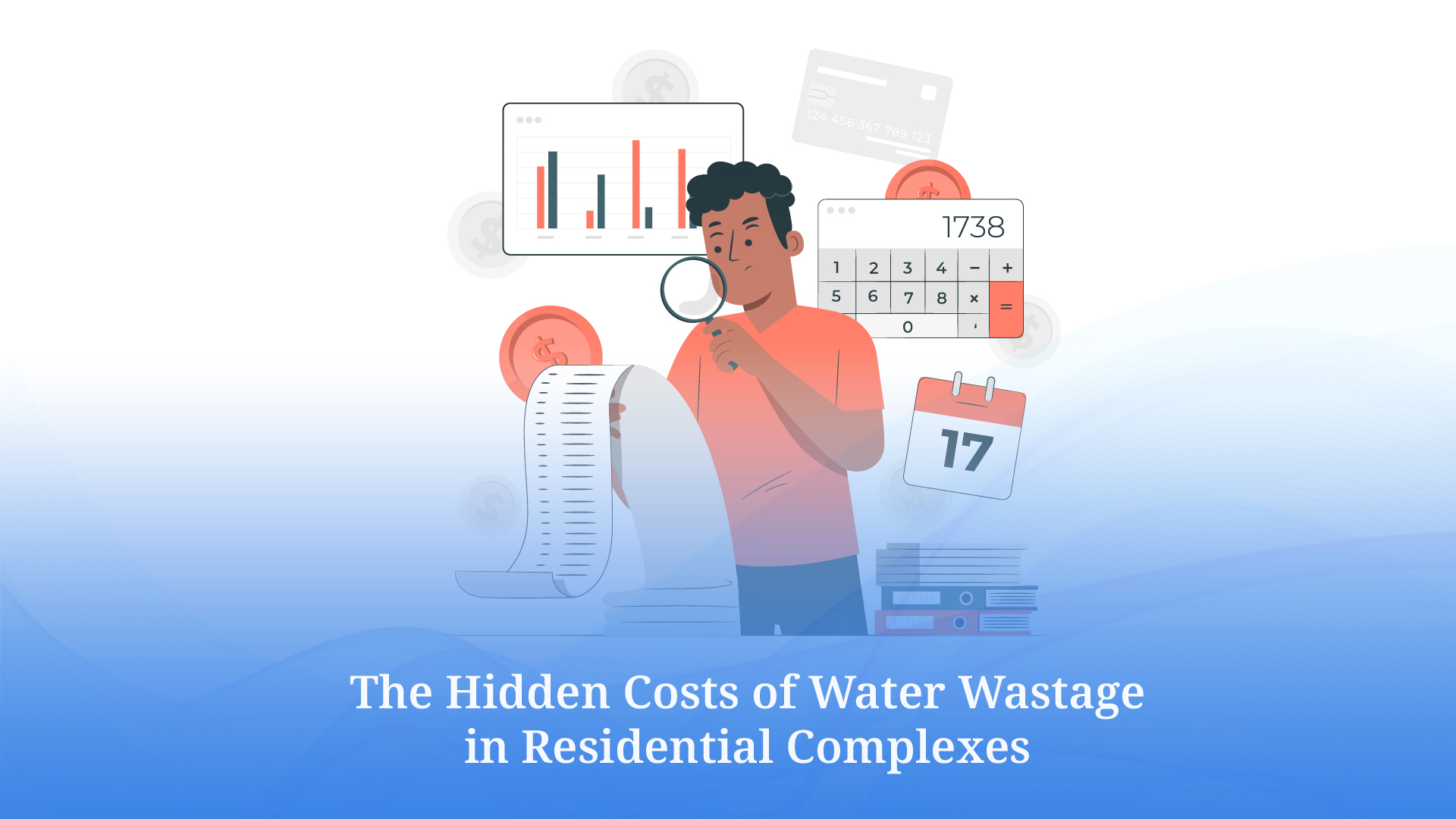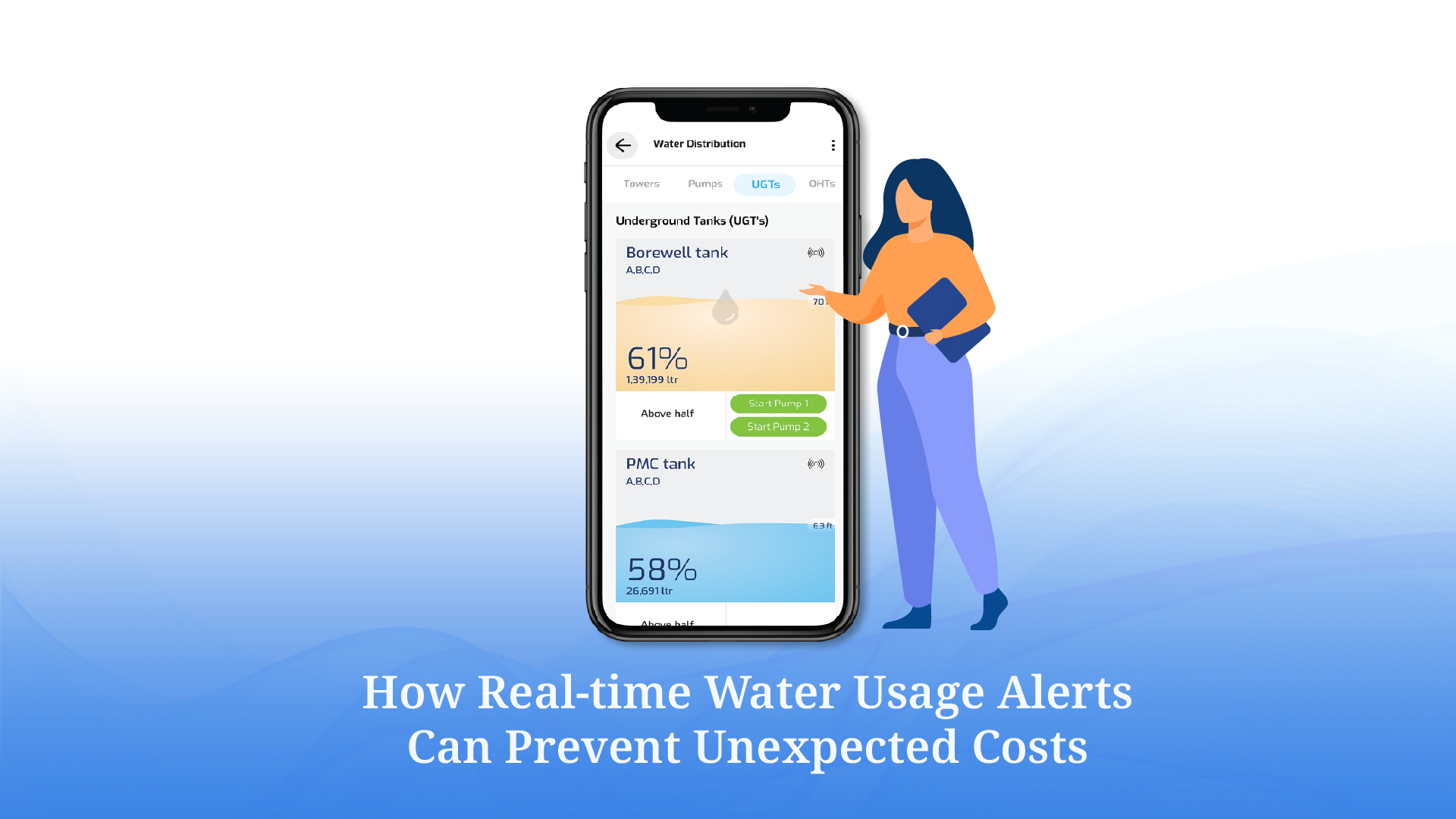The Hidden Costs of Water Wastage in Residential Complexes

Water wastage in residential complexes is a silent drain—on finances, resources, and sustainability. While a dripping faucet or an overflowing tank might seem trivial, the collective impact of such inefficiencies leads to skyrocketing utility bills, expensive repairs, and unnecessary strain on local water supplies. Many housing societies overlook these issues until they become costly problems, affecting both residents and the environment.
Understanding Water Wastage in Residential Complexes
From small leaks to inefficient household habits, everyday issues can lead to significant loss. Here are the primary causes of water wastage:
-
Leaky Faucets and Pipes
A slow-dripping tap might not seem like much, but it can waste thousands of litres of water annually. Undetected pipe leaks, especially in older buildings, contribute to excessive water loss, increasing both water bills and repair costs.
-
Inefficient Plumbing Fixtures
Outdated toilets, showerheads, and taps use more water than necessary. Without water-efficient fittings, residents end up consuming more than needed for daily activities, leading to unnecessary wastage.
-
Faulty or Overfilled Water Tanks
Many housing complexes suffer from water tank overflow due to faulty float valves or lack of proper monitoring. This not only results in water wastage but also adds to maintenance issues and potential structural damage.


The Financial Impact of Water Wastage in Residential Areas
While many assume water loss is a minor issue, the hidden costs accumulate over time. Here are some key financial consequences:
-
Rising Water Bills
The most immediate financial impact of water wastage is increased utility costs. Leaks, inefficient appliances, and careless water usage can significantly inflate monthly bills.
-
Structural Damage
Over time, leaks, especially in concealed pipes, can cause damp walls, mould growth, and weakened foundations, resulting in expensive maintenance work.
-
Declining Property Value
Housing societies with poor water management may face declining property values due to increased maintenance issues and higher living costs.
Environmental Consequences of Water Wastage in Residential Complexes
Every drop wasted contributes to the depletion of natural resources. Here are some of the most pressing environmental impacts:
-
Depletion of Local Resources
Excessive water usage strains local sources. For instance, rising freshwater demand in Bangalore has led to heavy reliance on both Cauvery River water and groundwater extraction. Depleting water tables, alongside water supply shortages, further exacerbate water crises, affecting residential areas and surrounding ecosystems.
-
Soil Erosion and Flooding Risks
Overwatering gardens or water tank overflows can contribute to soil erosion, but poor drainage and unplanned urban development play a larger role in weakening ground stability. This degrades landscapes and increases the risk of localised flooding in residential areas.
-
Loss of Aquatic Life
Excessive water usage itself does not directly affect aquatic life, but improper disposal of wastewater can contaminate nearby water bodies. Pollutants from untreated sewage and residential waste enter rivers and lakes, harming aquatic life and disrupting delicate ecosystems.
Practical Solutions to Reduce Water Wastage in Homes
Right water-saving solutions can lead to significant savings and a more sustainable lifestyle. Here are some practical steps:
-
Fix Leaks Promptly
Regularly checking and repairing leaks in bathrooms, kitchens, and water tanks can prevent unnecessary wastage and reduce water bills.
-
Use Smart Water Meters
Smart water meters help track consumption in real-time. This allows homeowners and housing societies to identify patterns and detect leaks early.
-
Collect and Reuse Water
Rainwater harvesting systems and greywater recycling can be used for watering plants, cleaning, and flushing toilets. This reduces dependence on freshwater sources.
-
Prevent Tank Overflows
Many homes and residential complexes experience water loss due to overflowing tanks. Installing automatic shut-off valves can help prevent this common issue.
The Role of Planet Smart City in Combatting Water Wastage
Intelligent technology is transforming the way residential complexes manage water usage, and Planet Smart City is at the forefront of this innovation. Here’s how Planet SIM empowers societies:
-
Automated Refills
Planet SIM prevents unnecessary water overflow and wastage by automatically detecting low tank levels and refilling them only when needed. This ensures that water distribution remains efficient.
-
Real-Time Monitoring
With real-time tracking, Planet SIM provides residents with detailed insights into their community’s water usage. The system offers tower-wise consumption reports, helping identify high-usage areas and enabling targeted conservation strategies.
-
Leak Detection
Undetected leaks can lead to significant water loss and infrastructure damage. In a Pune housing society, Planet SIM detected an underground pipe burst, reportedly saving an estimated 300,000 litres of drinking water per day.
Long-Term Benefits of Addressing Water Wastage with Planet Smart City Solutions
With innovative solutions like Planet SIM, communities can optimise water use, cut costs, and contribute to environmental conservation. Here are the key long-term benefits:
-
Improved Sustainability
By cutting down on excess water usage, housing societies can support local water conservation. In cities like Pune, rising water demand and limited supply are widening the gap. Without immediate action, the strain will increase. However, smart management ensures better resource availability for future generations.
-
Lower Carbon Footprint
By reducing unnecessary water consumption, residential complexes also lower overall energy use. In cities like Bangalore, where the energy-intensive process of pumping Cauvery River water accounts for 60% of BWSSB’s electricity consumption, smart water management can significantly reduce carbon footprints.
At Planet Smart City, we are dedicated to transforming water management practices through innovative, data-driven solutions. By adopting smart solutions like Planet SIM, housing societies can take meaningful steps toward long-term water conservation.
Popular Searches
water management system | how to prevent wastage of water | tips for energy conservation | measuring electricity | pre-scheduling tanker management system | sustainable water management | problems faced by society | how to repair water tank leakage | reasons for water shortage | how to identify leakage in pipes | water level indicator for water tank | energy efficient buildings | how to measure water level in tank | water problems in pune | intelligent lighting system | different types of water tanks | why manual water pump is outdated | water delivery challenges | save water in summer| water shortages in building




